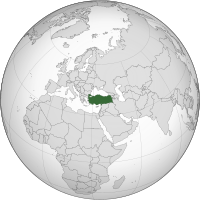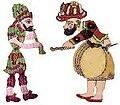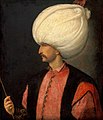Merhaba! Türkiye portalına hoşgeldiniz. Hi! Welcome to the Turkey portal.
 | |

| |
Turkey, officially the Republic of Türkiye, is a country mainly in Anatolia in West Asia, with a smaller part called East Thrace in Southeast Europe. It borders the Black Sea to the north; Georgia, Armenia, Azerbaijan, and Iran to the east; Iraq, Syria, and the Mediterranean Sea (and Cyprus) to the south; and the Aegean Sea, Greece, and Bulgaria to the west. Turkey is home to over 85 million people; most are ethnic Turks, while ethnic Kurds are the largest ethnic minority. Officially a secular state, Turkey has a Muslim-majority population. Ankara is Turkey's capital and second-largest city; Istanbul is its largest city, and its economic and financial center, as well as the largest city in Europe. Other major cities include İzmir, Bursa and Antalya.
Human habitation began in the Late Paleolithic. Home to important Neolithic sites like Göbekli Tepe and some of the earliest farming areas, present-day Turkey was inhabited by various ancient peoples. Hattians were assimilated by the incoming Anatolian peoples. Increasing diversity during Classical Anatolia transitioned into cultural Hellenization following the conquests of Alexander the Great; Hellenization continued during the Roman and Byzantine eras. The Seljuk Turks began migrating into Anatolia in the 11th century, starting the Turkification process. The Seljuk Sultanate of Rum ruled Anatolia until the Mongol invasion in 1243, when it disintegrated into Turkish principalities. Beginning in 1299, the Ottomans united the principalities and expanded; Mehmed II conquered Istanbul in 1453. During the reigns of Selim I and Suleiman the Magnificent, the Ottoman Empire became a global power. From 1789 onwards, the empire saw major transformation, reforms, and centralization while its territory declined.
In the 19th and early 20th centuries, persecution of Muslims during the Ottoman contraction and in the Russian Empire resulted in large-scale loss of life and mass migration into modern-day Turkey from the Balkans, Caucasus, and Crimea. Under the control of the Three Pashas, the Ottoman Empire entered World War I in 1914, during which the Ottoman government committed genocides against its Armenian, Greek and Assyrian subjects. After its defeat, the Ottoman Empire was partitioned. The Turkish War of Independence resulted in the abolition of the sultanate in 1922 and the signing of the Treaty of Lausanne in 1923. The Republic was proclaimed on 29 October 1923, modelled on the reforms initiated by the country's first president, Mustafa Kemal Atatürk. Turkey remained neutral during most of World War II, but was involved in the Korean War. Coups in 1960 and 1980 interrupted the transition to a multi-party system.
Turkey is an upper-middle-income and emerging country; its economy is the 18th- or 11th-largest in the world. It is a unitary presidential republic. Turkey is a founding member of the OECD, G20, and Organization of Turkic States. With a geopolitically significant location, Turkey is a regional power and an early member of NATO. An EU-candidate, Turkey is part of the EU Customs Union, CoE, OIC, and TURKSOY. Turkey has coastal plains, a high central plateau, and various mountain ranges; its climate is temperate with harsher conditions in the interior. Home to three biodiversity hotspots, Turkey is prone to frequent earthquakes and is highly vulnerable to climate change. Turkey has universal healthcare, growing access to education, and increasing innovativeness. It is a leading TV content exporter. With 21 UNESCO World Heritage sites, 30 UNESCO intangible cultural heritage inscriptions, and a rich and diverse cuisine, Turkey is the fourth most visited country in the world. (Full article...)
Selected article -
Dilek Peninsula-Büyük Menderes Delta National Park (Turkish: Dilek Yarımadası-Büyük Menderes Deltası Millî Parkı), established on May 19, 1966, is a national park in western Turkey. It contains within its borders the entirety of the Dilek Peninsula as well as the large delta of the Büyük Menderes River. The park is located in the Kuşadası district of Aydın Province — part of Turkey's Aegean Region. Directly west of the national park is the small coastal town of Güzelçamlı, where several shuttle buses and ferries operate to and from the district's center of Kuşadası, approximately 30 km (19 mi) from the park.
The park is among the most biologically diverse of Turkey's national parks. It is the native and migratory habitat of hundreds of species of birds, mammals, plants, and marine life, some of which are entirely endemic to the park and cannot be observed anywhere else in the world. For these reasons, it is protected by numerous wildlife and wetland conventions, and is of great national and international importance in these areas. (Full article...)General images
Did you know -
- ... that the award-winning Turkish restaurant Changa in Istanbul is being supervised by the Kiwi chef Peter Gordon? (February 23, 2008)
- ... that in Rose Macaulay's novel The Towers of Trebizond (1956) the English traveller Aunt Dot aims to emancipate the women of Turkey by converting them to Anglicanism and popularizing the bathing hat? (November 19, 2007) Wikipedia:Recent additions 188
- ... that the ticket lottery site for the December 2007 Ahmet Ertegün Tribute Concert featuring Led Zeppelin, crashed due to over a billion page views of fans seeking to purchase the 20,000 tickets on sale? (January 8, 2008) Wikipedia:Recent additions 198
- ... that the Ottoman torpedo boat Sultanhisar attacked and seriously damaged the Australian submarine HMAS AE2 in 1915 but rescued all the crew before the submarine went down in the Sea of Marmara? (April 12, 2011)
- ... that the military prowess of the Tulunid dynasty of Arab Egypt was due to its multi-ethnic army composed of Turkish, Sudanese, and Greek soldiers? (May 10, 2008) Wikipedia:Recent additions 219
- ... that, when completed, the Deriner Dam will be the tallest in Turkey? (September 7, 2010)
- ... that the Ottoman frigate Ertuğrul disaster, which occurred in 1890 off Kushimoto, led to strengthening foreign relations between Turkey and Japan? (January 16, 2008) Wikipedia:Recent additions 200
Selected picture
Selected biography -
Makbule Hande Özyener (born 12 January 1973), better known by her stage name Hande Yener, is a Turkish singer. She made her debut in the early 2000s, and since then has become a prominent figure of Turkish pop music with numerous songs that topped the music charts. Alongside her music career, she is also known for her choice of clothes and has renewed her image multiple times over the years. She has occasionally made changes in her music style as well; for a while, she started making electronic music, but this period was short-lived and she again returned to performing pop music. During her career, both her professional and personal life have been among the favorite subjects of columnists, and her rivalry and on and off feud with Demet Akalın were covered in the tabloids from time to time.
Yener was born in Kadıköy, Istanbul. After finishing her middle school she decided to go to a conservatory, but after facing objections from her family, she enrolled in Erenköy Girls High School. She left the school while in the second grade and got married. To achieve her dream of becoming a singer, she tried to get in contact with Sezen Aksu, and while she was working as a shop assistant she met Hülya Avşar who later introduced her to Aksu. She worked as Aksu's backing vocalist for a while, before working with Altan Çetin who helped her with preparing her first studio album, Senden İbaret, which was released in 2000. She later released the MÜ-YAP certificated album Sen Yoluna... Ben Yoluma... (2002), followed by Aşk Kadın Ruhundan Anlamıyor (2004) and Apayrı (2006). These albums made her one of the successful artists inside Turkey in the 2000s. With the album Nasıl Delirdim? (2007), she shifted her style to electronic music and distanced herself from pop music for a while. During this period, which formed the first decade of her career, many of her songs became hits, including "Yalanın Batsın", "Sen Yoluna... Ben Yoluma...", "Acele Etme", "Kırmızı", "Kelepçe", "Aşkın Ateşi", "Kibir" and "Romeo". (Full article...)Selected video -
Selected quote -
| “ | Everything we see in the world is the creative work of women. | ” |
Recognized content
Provinces
Related portals
Religions in Turkey
Neighbouring countries
Countries with related heritage
WikiProjects
Turkish wikipedia
 |
There is a Turkish version of Wikipedia, the free encyclopedia. |
Wikimedia
The following Wikimedia Foundation sister projects provide more on this subject:
-
 Commons
Commons
Free media repository -
 Wikibooks
Wikibooks
Free textbooks and manuals -
 Wikidata
Wikidata
Free knowledge base -
 Wikinews
Wikinews
Free-content news -
 Wikiquote
Wikiquote
Collection of quotations -
 Wikisource
Wikisource
Free-content library -
 Wikiversity
Wikiversity
Free learning tools -
 Wikivoyage
Wikivoyage
Free travel guide -
 Wiktionary
Wiktionary
Dictionary and thesaurus
-

-

-

-

-
Random portal



































































































